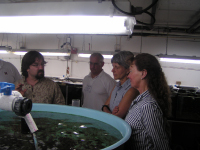 |
|
| Caption describing this photo goes here Caption describing this photo | |
The participants toured the University of Maine’s Aquaculture Research Complex in Orono and the Center for Cooperative Aquaculture Research in Franklin, ME. The teachers were introduced to the variety of aquaculture research at UM facilities and Mr. Mike Pietrak of the Maine Aquaculture Association provided a keynote presentation on aquaculture-related teaching resources available to Maine teachers. The workshop concluded with an hands-on exploration of software and databases that can be used to demonstrate mathematical concepts in ecology and genetics.
2007 Aquaculture Workshop
Two teachers who attended the 2006 Aquaculture workshop, Jane Grover and Kevin Malady, returned to the University of Maine during the summer of 2007. Over a three-day period Jane and Kevin discussed potential lesson plans based on the concepts covered during the 2006 workshop. Two activities that received the most attention included keeping marine clownfish in classroom aquaria and demonstrating the effects of nutrition on fish coloration and exercises investigating the effects of genetics and environment on zebrafish development. The discussion also included ideas on how to "export" potential lessons to other teachers.
2008 Aquaculture Workshop
The Aquaculture workshop was held a second time in 2008; again in conjunction with National Teachers Conference organized by the University of Maine’s Center for Science and Mathematics Education Research. Seven teachers from Maine and New Hampshire attended the workshop and discussed topics such as, working with small scale aquaculture systems (aquariums) for classroom based demonstrations of basic aquariology, water chemistry, filtration (biological, chemical, mechanical), the aquatic food web, the biology of different types of aquatic organisms, and the role of genetic improvement in aquaculture. The teachers were introduced to the diversity of aquaculture research programs at The University of Maine and elsewhere in the state. As part of the workshop, the teachers visited the University of Maine’s Darling Marine Center and the center’s state of the art flowing seawater labs and research facilities. In particular, the workshop introduced teachers to the University of Maine’s Oyster Broodstock Development Program and the bivalve hatchery and the teachers were treated to a cruise up the Damariscotta River to view oyster farms and other activities on the river.

